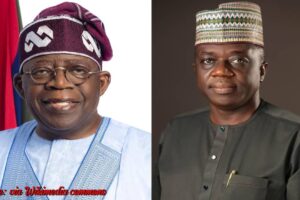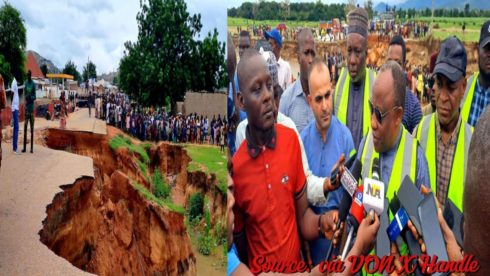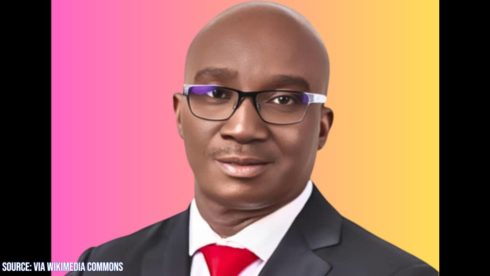President Bola Ahmed Tinubu has granted approval for the immediate reconstruction of the collapsed Wagga-Madagali Bridge, a crucial link connecting Adamawa and Borno States in Nigeria’s North-east region. This significant development was announced by Mohammed Goni Alkali, the Managing Director/CEO of the North East Development Commission (NEDC), during an assessment tour of the bridge site. Alkali was joined by Abdulsalam Y. Ahmed, the Executive Director (Operations), along with other key management staff from the Commission.
President Bola Ahmed Tinubu’s decision to prioritize this reconstruction project underscores the strategic importance of the Wagga-Madagali Bridge to the region’s infrastructure and economic development. By swiftly approving the reconstruction, President Tinubu has demonstrated his administration’s commitment to addressing critical infrastructure needs and fostering regional connectivity. This move is expected to have far-reaching positive impacts on trade, security, and the overall quality of life for residents in the affected areas.
President Bola Ahmed Tinubu: Rebuilding a Critical Infrastructure
The reconstruction of the Wagga-Madagali Bridge represents a vital infrastructure project aimed at restoring the essential connection between Adamawa and Borno States. The bridge’s collapse, caused by severe flooding in the area, has resulted in significant disruptions to commuter traffic and economic activities. The NEDC’s assessment tour marks a crucial step towards implementing the President’s directive, with a particular focus on identifying interim solutions to facilitate vehicular movement along the affected route until the full reconstruction work commences.
The importance of this bridge cannot be overstated, as it serves as a lifeline for commerce, social interactions, and security operations in the region. Its reconstruction is expected to revitalize local economies, improve access to essential services, and enhance the overall resilience of the area’s infrastructure network. The project aligns with broader national goals of infrastructure development and regional integration, particularly in areas that have faced security challenges and natural disasters.
Assessment Tour: Evaluating the Damage
The assessment tour led by Mohammed Goni Alkali aimed to comprehensively evaluate the extent of damage inflicted by the flood on the Wagga-Madagali Bridge. This on-site inspection is crucial for gathering firsthand information that will inform the design and implementation phases of the reconstruction project. The team’s findings will play a pivotal role in determining the scope of work required, potential challenges, and the most effective approaches to rebuilding the bridge.
With President Bola Ahmed Tinubu’s approval secured, the NEDC can now proceed with the necessary steps to initiate the reconstruction process. This includes detailed engineering assessments, environmental impact studies, and the development of a comprehensive project plan. The Commission’s approach emphasizes the importance of rebuilding the bridge to meet or exceed previous standards, incorporating resilience measures to withstand future environmental challenges.
President Bola Ahmed Tinubu: Alternative Solutions, Mitigating the Impact
Recognizing that the full reconstruction of the bridge may not commence immediately due to ongoing rainy season conditions, the NEDC is actively exploring alternative solutions to mitigate the impact of the bridge’s collapse. These interim measures are aimed at ensuring that vehicles can continue to traverse the affected area, minimizing disruptions to economic activities and the daily lives of local residents.
Potential short-term solutions being considered may include temporary bypass routes, pontoon bridges, or reinforced fords. These alternatives will be carefully evaluated based on their feasibility, safety, and ability to provide reliable passage until the permanent reconstruction is completed. The Commission’s proactive approach in this regard demonstrates a commitment to addressing both immediate needs and long-term infrastructure goals.
President Bola Ahmed Tinubu’s Reconstruction Plan: A Comprehensive Approach
The reconstruction plan for the Wagga-Madagali Bridge will adopt a comprehensive approach, taking into account the hydrological and geological factors that contributed to its collapse. The NEDC plans to engage with engineering experts and environmental specialists to design a robust and durable structure capable of withstanding future flood events and ensuring long-term user safety.
Key considerations in the reconstruction plan may include enhanced flood resistance measures, improved drainage systems, and the use of advanced materials and construction techniques. The Commission is likely to prioritize sustainability and resilience in the new design, potentially incorporating features that will make the bridge less vulnerable to environmental stresses. This forward-thinking approach aims to create infrastructure that not only meets current needs but also anticipates future challenges.
President Bola Ahmed Tinubu’s Commitment to Infrastructure Development
President Bola Ahmed Tinubu’s approval for the reconstruction of the Wagga-Madagali Bridge is a clear demonstration of his administration’s commitment to infrastructure development in the North-east region. This project is part of a broader effort to rebuild and enhance critical infrastructure in areas affected by insurgency and natural disasters, with the ultimate goal of promoting economic growth and improving living standards in the region.
The reconstruction of the bridge aligns with national strategies for regional development and security enhancement. By investing in such critical infrastructure, the government aims to create a more conducive environment for economic activities, facilitate easier movement of goods and people, and strengthen the overall resilience of communities in the North-east. This project serves as a tangible example of the administration’s dedication to addressing the unique challenges faced by different regions of the country and fostering inclusive development.
Table of Contents
Discover more from OGM News NG
Subscribe to get the latest posts sent to your email.














